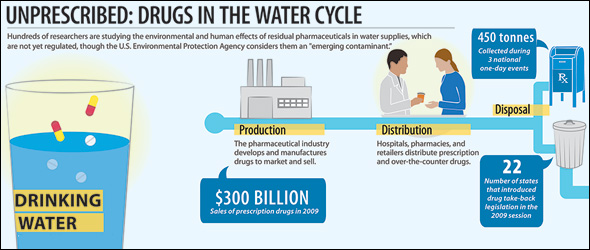Drugs in the Water (And Ways to Prevent that from Happening)
Last month’s national drug takeback day was more popular than ever. Antibiotic-resistant genetics have been found in California wetlands. FDA seeks voluntary disclosure of antibiotics in animal feed.
Twice a year, the federal Drug Enforcement Administration (DEA) holds a national “takeback” day where citizens can drop off their expired or unwanted medications for proper disposal. Since the first collection day in September 2010, each event has brought in a bigger stash than the last.
Last week, the DEA announced the haul from its April 28 event was a record 250.5 metric tons (552,161 pounds) of medicine cabinet detritus.
There are many reasons to worry about the tons of unwanted medications that are improperly disposed of:
- Many pills are thrown into the trash or flushed down the toilet, eventually entering waterways.
- Numerous studies have shown that even minute concentrations of pharmaceuticals can alter the sex characteristics of fish and frogs.
- There is also the chance that bacteria — once introduced to an environment with low doses of, say, penicillin — will become resistant to the drug’s effect.
Which brings us to this story, out of San Diego.
David Cummings, a microbiologist at Point Loma Nazarene University, has found antibiotic-resistant genes in the wetlands of the Tijuana River Valley.
“Genes that confer antibiotic resistance may in fact pose a more serious long-term public and ecosystem health threat than many pollutants in urban stormwater.”
–Professor David Cummings to U-T San Diego
Researchers at Loyola Marymount University in Los Angeles have found similar circumstances in wetlands near Los Angeles International Airport.
Now, humans are not the only ones taking drugs. We also feed them in muscle-popping quantities to animals on factory farms, which are another significant source of pharmaceuticals in water bodies. (The science is still uncertain as to the relative percentages.)
Last month, the Food and Drug Administration (FDA) took a baby step by asking drug companies to change the marketing and labeling of these “growth-promoting” drug-food concoctions.
Any reductions, however, are voluntary.
–Brett Walton
Circle of Blue reporter
Brett writes about agriculture, energy, infrastructure, and the politics and economics of water in the United States. He also writes the Federal Water Tap, Circle of Blue’s weekly digest of U.S. government water news. He is the winner of two Society of Environmental Journalists reporting awards, one of the top honors in American environmental journalism: first place for explanatory reporting for a series on septic system pollution in the United States(2016) and third place for beat reporting in a small market (2014). He received the Sierra Club’s Distinguished Service Award in 2018. Brett lives in Seattle, where he hikes the mountains and bakes pies. Contact Brett Walton






